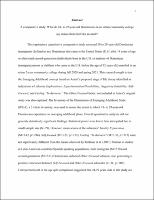Please use this identifier to cite or link to this item:
https://hdl.handle.net/20.500.12202/7922| Title: | A comparative study: What do 18- to 29-year-old Dominicans in an urban community college say makes them feel like an adult? |
| Authors: | Levy, Lynn H. Krase, Kathryn Suzanne Abbott, Ann Hernandez, Ramona Fernández-Ketcham, Evelyn |
| Keywords: | Social Work Behavioral Sciences Psychology emerging adulthood emerging adults in higher education immigrant and second-generation Dominicans life stages markers of adulthood urban emerging adults |
| Issue Date: | Feb-2022 |
| Citation: | Fernández-Ketcham, E. (2022, February), A comparative study: What do 18- to 29-year-old Dominicans in an urban community college say makes them feel like an adult? (Publication No. 28967579) [Doctoral dissertation, Yeshiva University]. ProQuest Dissertations & Theses Global. |
| Series/Report no.: | ProQuest Dissertations & Theses Global.;Publication No. 28967579 |
| Abstract: | This exploratory quantitative comparative study surveyed 18 to 29-year-old Dominican immigrants (defined as any Dominican that came to the United States (U.S.) after 14 years of age or older) and second-generation (individuals born in the U.S. or territory of Dominican immigrant parents or children who came to the U.S. before the age of 12 years old) enrolled in an urban 2-year community college during fall 2020 and spring 2021. This research sought to test the Emerging Adulthood concept based on Arnett’s proposed stage of life theory identified as indications of: Identity Explorations; Experimentation/Possibilities; Negativity/Instability; Self-Focused; and Feeling “In-Between.” The Other-Focused factor, not included in Arnett's original study was also explored. The Inventory of the Dimensions of Emerging Adulthood Scale (IDEA), a 31-item inventory, was used to assess the extent to which 18- to 29-year-old Dominicans experience an emerging adulthood phase. Overall quantitative analyses did not generate statistically significant findings. Statistical power were lower than anticipated due to small sample size (N=79). However, mean scores of the subscales’ Identity Exploration (M=3.42, p=.286), Self-focused (M=3.23, p=.133), Feeling “In-Between" (M=3.30, p=.515) were not significantly different from the means observed by Reifman et al. (2007). Similar to studies in Latin-American countries/Spanish speaking populations, both immigrant (M=2.78) and second-generation (M=2.61) Dominicans endorsed Other-Focused subscale, also generating a positive correlation between Self-Focused and Other-Focused subscales (r=.34, p=.002). Unexpected result in the age split comparison suggested that 24-29 years olds in this study are experiencing an emerging adulthood stage. Open-ended questions imply influence on the responses due to COVID-19, a global pandemic. |
| Description: | Doctoral dissertation, PhD / Open Access |
| URI: | https://hdl.handle.net/20.500.12202/7922 https://ezproxy.yu.edu/login?url=https://www.proquest.com/dissertations-theses/comparative-study-what-do-18-29-year-old/docview/2635468445/se-2 |
| Appears in Collections: | Wurzweiler School of Social Work: Dissertations |
Files in This Item:
| File | Description | Size | Format | |
|---|---|---|---|---|
| Evelyn Fernández-Ketcham Dissertation FEBRUARY 2022 FINAL 10039.pdf | 2.96 MB | Adobe PDF |  View/Open |
This item is licensed under a Creative Commons License

